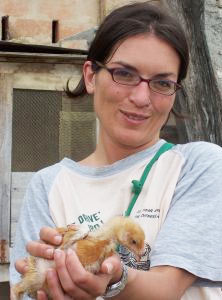
I’m a fourth-generation farmer, and my dad is a farmer. My dad’s father was a farmer, his father was a farmer, and his father was a slave. The farm that my grandfather had has been in the family for over 100 years and passed down from generation to generation.
It’s been an uphill battle, not only for myself, but for thousands of other black farmers from around the country. Out here in these rural communities, most black farm families [know] other black farm families in the community. Most of us had family land. Most of us had generational knowledge of farming, grew up on a farm. We’ve endured discrimination, not getting any loans.
We were all struggling to hold onto our farms because we didn’t have any money. Some of them don’t have running water. Many of them don’t have telephones. In 1995, I said, “We can form an organization that addresses the needs and the problems of black farmers.” We went back and forth about the name. [Someone] said, “I think we should call ourselves the Minority Farmers Association.” And I said, “No, if they were looking at us from a group perspective as black farmers, why not call ourselves black farmers?” While we were having this discussion about the name of the association, [the electric company] turned my lights out. And Mr. Warren said, “Well, that’s settled. We’re in the dark. It’s black in here. We’re gonna call ourselves theBlack Farmers Association.” And that was the end of the debate.
I wanted to see some type of vindication for the black farmers; I’m haunted by the faces. We lost so much land. I doubt if we’ll get all of our land back. I’ve been traveling the country, trying to do a wake-up call to Black America that land is power. People talk about education all the time; education is a big tool, and I agree. But land ownership is also a big tool. The three necessities of life come from land: food, clothing, shelter. Black farm families have to get their kids and grandkids to show some interest. If we’re going to make changes, there has to be somebody, one person, in that family that’s interested in farming.
The most troubling part of the whole story was my great-grandfather was able to obtain land after the Civil War, keep it, pass it on to a generation, and here I am, supposed to be a free man. Why can’t I live this life that my forefathers lived? Why can’t I obtain credit? The question is not why I stay in it. The question is, Why can’t I?

